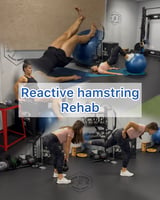Introduction As parents of young athletes, ensuring your kids’ safety and well-being is a top...
You Tore Your ACL, Now What?
You Tore Your ACL, Now What?
Each year, over 250,000 Anterior cruciate ligament (ACL) injuries occur in the US. So understand you are not alone and that the doctors at Core Values Physical Therapy and Performance in Orlando and Winter Garden are here to help. ACL injuries account for 50% or more of all knee injuries,7 making this ligament especially important in any discussion of knee injuries.
Tearing your ACL can be a life-altering injury, affecting not only your physical abilities but also your mental well-being. Whether you're an athlete, a weekend warrior, or simply someone who enjoys staying active, an ACL tear can feel devastating. But there's hope! Understanding what comes next and how to navigate the recovery process is crucial for a successful comeback.
An ACL (anterior cruciate ligament) tear is one of the most common knee injuries, especially among athletes. The ACL is a key ligament that helps stabilize your knee joint. When it tears, you might hear a "pop" sound, followed by severe pain, swelling, and instability in your knee. This injury can result from sudden stops, changes in direction, or awkward landings.
Treatment options for an ACL tear typically include surgical and non-surgical methods. Surgery often involves reconstructing the torn ligament using a graft, while non-surgical options might include bracing and physical therapy. The best approach depends on several factors, including the severity of the tear, your activity level, and overall health. There is a small population of people who will recover fully without surgery and they are known as copers.
The Indispensable Role of Physical Therapy
Physical therapy is crucial in managing an ACL tear, regardless of whether you opt for surgery or go with a non-operative approach. At Core Values Physical Therapy, we understand the intricacies of this injury and provide personalized treatment plans to help you regain your strength and mobility. Physical therapy before your surgery is key to ensuring a successful surgical outcome. The goal with pre-surgical physical therapy is to alleviate swelling and pain, normalize range of motion, and normalize walking mechanics.
Post-op physical therapy is crucial but often times falls short of what an athlete really needs to be ready to return to sports. That is where Core Values Performance and Physical Therapy comes in. We make sure you are fully ready with our return to sport post-op guidelines.
Physical therapy focuses on reducing pain and swelling, restoring knee function, and preventing further injury. Our therapists use a combination of exercises, manual therapy, and education to guide you through each stage of recovery.
Is It Essential to Seek Professional Help?
Yes, professional help is essential for a full recovery from an ACL tear. At Core Values Performance and Physical Therapy, our experienced physical therapists can create a tailored plan that addresses your specific needs. This personalized approach ensures that you not only recover but also improve your overall performance and prevent future injuries.
Early Intervention
Early diagnosis and treatment are critical for the best outcomes in ACL tear recovery. Starting physical therapy before surgery (pre-op therapy) can help reduce inflammation, maintain muscle strength, and improve overall knee function. This preparation can make post-surgical recovery more efficient and effective.
The post-op Rehab Process
Surgical rehabilitation is split into stages based on timeline and goal-based checkpoints designed to guide you through the phases of rehab. Each timeline will differ depending on what other structures were involved and surgically fixed as well as what your performance goals are.
A realistic expectation for your rehab process looks like this:
Stage 1 (0-2 weeks post-op): The doctors at Core Values will focus on controlling pain, managing the incision, reducing swelling, and working on range of motion and muscle activation.
Stage 2 (2-6 weeks post-op): The ACL graft consolidates meaning the graft used in ACL reconstruction surgery becomes fully integrated into the knee joint. This involves biological changes that allow the graft to become part of the body's tissue, effectively replacing the damaged ACL. During this consolidation period, the graft undergoes remodeling and revascularization, where new blood vessels grow into the graft, providing it with nutrients and helping it to strengthen and function like the original ligament. This phase is crucial for the long-term stability and strength of the knee, and it typically occurs in the first few months after surgery.
During this phase the doctors at Core Values Physical Therapy work to increase range of motion, start gentle exercise and bike work, focus on quad and hamstring exercises, reduce swelling, strengthen muscles, ensure wounds are fully healed, and begin scar work.
Stage 3 (6-12 weeks post-op): Begin land-based training where the doctors at Core Values Physical Therapy start to focus on reactivation and normalization of range of motion. We continue to work on hamstring, quad, glute, trunk, and pelvis mechanics. This phase is also where we start to incorporate heavier strength, plyometrics, and proprioceptive training.
Stage 4 (3-5 months post-op): Advanced rehabilitation begins with more land-based proprioceptive and plyometric exercises. These exercises will be progressed based on tolerance to previous work. Medically, we ensure the graft has ligamentized and passed structural tests like Lachman's. We will also work on good patella tracking, calf circumference, and glute firing sequence. At this time, we can begin sports specific training and conditioning. Athletes can also begin a return to run program during this phase.
Stage 5 (5-6 months post-op): Engage in sports-specific and advanced training under your doctor of physical therapy’s supervision to prepare for a return to full activity. Return to performance vs. Return to sport vs. return to participation are also different phases or the ACL process. Younger athletes tend to need a longer recovery time of roughly 9-12 months for return to sports to ensure full recovery and reduce re-injury rates.
Pain Management
Managing pain effectively is a crucial part of ACL tear recovery. Physical therapy techniques, such as edema management, taping, electrical stimulation, dry-needling and specific exercises, can help alleviate pain and reduce inflammation. Your physical therapist at Core Values Performance and Physical Therapy will work with you to create a pain management plan tailored to your needs.
Preventing Future Episodes
Preventing future ACL injuries involves strengthening the muscles around your knee, improving your mobility, and learning proper movement techniques. We get you better than baseline so that this never happens again. Our athletes report feeling better and stronger than ever after working with us. Our team at Core Values Physical Therapy will provide you with exercises and education to minimize your risk of re-injury and ensure long-term knee health.
An ACL tear is a challenging injury, but with the right approach and support, you can make a full recovery. At Core Values Performance and Physical Therapy in Orlando and Winter Garden, our team of professionals is dedicated to helping you regain your strength, agility, mobility, sport specific movements and most importantly, your confidence. Don't let an ACL tear hold you back. Contact us today to start your recovery journey with the best physical therapy in Central Florida!
FAQ Section
Frequently Asked Questions
- How long does it take to recover from an ACL tear? Recovery time can vary, but it typically takes around 6-9 months to return to full activity with upward of a year to hit that same performance level as pre-surgical.
- Can an ACL tear heal without surgery? In some cases, non-surgical treatment, including physical therapy, can be effective, especially for those who are less active.
- What exercises can help prevent ACL injuries? Strengthening exercises for the quadriceps, hips and hamstrings, as well as balance and agility training, can help prevent ACL injuries.
- How do I know if I tore my ACL? Symptoms include a "pop" sound at the time of injury, severe knee pain, swelling, and instability. A physical exam and MRI can confirm the diagnosis.
Core Values Performance and Physical Therapy is here to help you every step of the way. Contact us today to learn more about our services and how we can assist in your ACL recovery journey.



